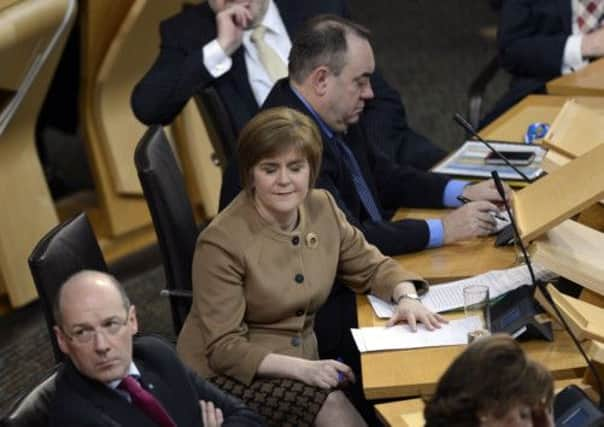Brian Monteith: Less social housing, less political bribery


And so in the year of Margaret Thatcher’s passing, Nicola Sturgeon, the SNP’s answer to that political titan of her generation, announces that in Scotland the right-to-buy scheme will become no more. As is so often the case with policies pursued by the late Conservative prime minister there is a great deal of myth-making by her opponents, nonsense being spoken and deceits presented as truth.
There is probably no single social reform of the Thatcher-era that so fundamentally defined her government’s ideological approach in challenging socialism for the benefit of the people. Yet for all the policy is identified with her, it had many adherents, including some of her most critical rivals such as Peter Walker, and the left-leaning Tory Reform Group, who claimed to have argued for the policy before her.
Advertisement
Hide AdAdvertisement
Hide AdThis meant that unlike many of her economic policies the whole of her party was united in supporting right-to-buy and the initiative could be pursued confidently and at speed.
Another misconception is that right-to-buy was something new; it existed already in some parts of Britain when the Conservatives came to power. The difference was that there was no consistency across councils, with some denying any council house sales at all. What the Tories did was create a national right-to-buy that empowered all tenants with discounts that were extended to speed up the implementation of the programme.
This was a typical piece of Thatcherism; use central powers to take control away from local councils and their vested interests, then devolve that power to individuals – in this case the ownership of property and the economic freedom and power that comes from it.
It is now commonplace to proclaim that right-to-buy was a policy suitable for its period but that it has outlived its usefulness and should be ended. This is usually said by those who either opposed it at the time, or who would have done so had they been politicians 35 years ago, to give them an air of being moderate and reasonable, but their opposition was anything but. The truth is, the collectivists in the Labour and nationalist parties feared right-to-buy for they knew that emasculating them was part of Thatcher’s attraction to the policy.
In the 20th century, governments of all colours had managed to make British housing heavily divided between those who rented public housing and those who owned their own homes. Scotland had more people in council housing than East Germany. Ever-stricter rent controls had all but snuffed out the private rented sector, with its place being taken by the public sector.
The problem, as Thatcher saw it, was the abuse of the state’s role in housing by local politicians and the Labour Party. Evidence was well-known of local councillors wielding great influence over their electorates by either holding back rises to heavily subsidised uneconomic rents or helping individuals queue-jump to gain homes. Councils ran up huge capital debts in developing their massive estates which soon became Labour fiefdoms where no private developer would be allowed to infiltrate and reduce their majorities.
Social housing, as its supporters now call it, was an invitation to taxpayer-funded corruption on a grand scale. Dismantling that edifice would transform more than peoples’ lives – it would depoliticise the housing market and cut the influence of Labour’s machine politicians.
The economic and social benefits were no less ideologically attractive. Suddenly the new council homeowners had an asset to borrow against to start their own business, they owned a property that they could decorate the way they wished, install new doors, new driveways, new kitchens or whatever they liked. This had nothing to do with materialism but was simply letting people stamp personal tastes and conveniences on their properties.
Advertisement
Hide AdAdvertisement
Hide AdThe DIY, double glazing and conservatory industries blossomed thanks to the shift from rental to ownership. And here’s the rub that corrupt politicians hated the most: all that had changed was the tenure, but when the owner died the property was now in the private sector and no longer available to be used as the next bribe in the electoral cycle.
The Conservatives were accused of not letting councils build homes with the receipts of the sales – but why encourage more council building at a loss, for further uneconomic rent and with further debt being piled up, when the receipts could reduce the debt for past housing projects? The economic case was simple, it saved money to offer discounts to existing tenants to buy their homes as they would then have the responsibility of maintaining them – rather than for the councils to build, repair and maintain properties at a large loss.
Instead, central funding was given to public agencies such as Scottish Homes and housing associations that councillors could not get their hands on, with much of it directed at building sheltered housing (quadrupling) and specialist homes for the disabled (up 500 per cent). Between 1979 and 1997 the Conservative government invested £8 billion in Scottish public housing, hardly the uncaring policies of a divisive elitist party only interested in the private sector.
When Nicola Sturgeon talks of properties being lost to the public sector through right-to-buy she really means properties are no longer under the control of politicians – a very good thing, I would argue.
If there is a case for social housing, surely it will be most efficiently delivered and justly distributed if it is managed by professional agencies, co-ops and trusts that have as little influence from politicians as possible.
Having social housing in the hands of politicians provides too tempting an opportunity for political bribery. The raft of regulations that squeeze the private rented sector combined with the ending of right-to-buy will only polarise Scottish society between the haves (homeowners) and have nots (social housing tenants). That this is dressed up as superior Scottish values is a sick joke that will become apparent within a generation.